劳伦斯《儿子与情人》开题报告(定稿)
《儿子与情人》中的语码转换研究的开题报告
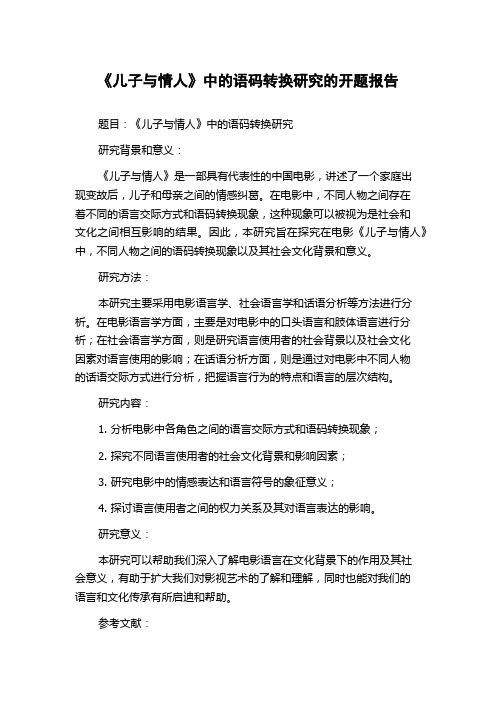
《儿子与情人》中的语码转换研究的开题报告题目:《儿子与情人》中的语码转换研究研究背景和意义:《儿子与情人》是一部具有代表性的中国电影,讲述了一个家庭出现变故后,儿子和母亲之间的情感纠葛。
在电影中,不同人物之间存在着不同的语言交际方式和语码转换现象,这种现象可以被视为是社会和文化之间相互影响的结果。
因此,本研究旨在探究在电影《儿子与情人》中,不同人物之间的语码转换现象以及其社会文化背景和意义。
研究方法:本研究主要采用电影语言学、社会语言学和话语分析等方法进行分析。
在电影语言学方面,主要是对电影中的口头语言和肢体语言进行分析;在社会语言学方面,则是研究语言使用者的社会背景以及社会文化因素对语言使用的影响;在话语分析方面,则是通过对电影中不同人物的话语交际方式进行分析,把握语言行为的特点和语言的层次结构。
研究内容:1. 分析电影中各角色之间的语言交际方式和语码转换现象;2. 探究不同语言使用者的社会文化背景和影响因素;3. 研究电影中的情感表达和语言符号的象征意义;4. 探讨语言使用者之间的权力关系及其对语言表达的影响。
研究意义:本研究可以帮助我们深入了解电影语言在文化背景下的作用及其社会意义,有助于扩大我们对影视艺术的了解和理解,同时也能对我们的语言和文化传承有所启迪和帮助。
参考文献:1. Hall, Stuart, and Paul Du Gay. Questions of Cultural Identity. Sage, 1996.2. Kress, G., & van Leeuwen, T. (2006). Reading images: The grammar of visual design. Routledge.3. Scollon, R. (2001). Mediated discourse as social interaction: A study of news discourse. Longman.4. Wodak, Ruth, and Michael Meyer. Methods of Critical Discourse Analysis. Sage publications, 2009.。
(精品)劳伦斯《儿子与情人》读书报告 (英文版)
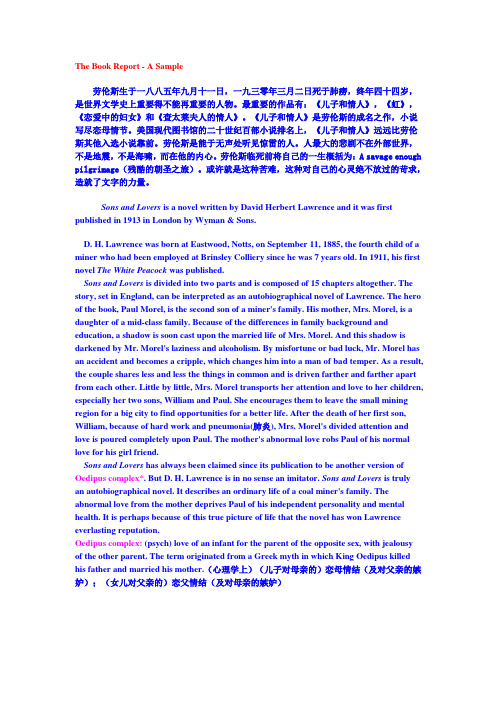
The Book Report - A Sample劳伦斯生于一八八五年九月十一日,一九三零年三月二日死于肺痨,终年四十四岁,是世界文学史上重要得不能再重要的人物。
最重要的作品有:《儿子和情人》,《虹》,《恋爱中的妇女》和《查太莱夫人的情人》。
《儿子和情人》是劳伦斯的成名之作,小说写尽恋母情节。
美国现代图书馆的二十世纪百部小说排名上,《儿子和情人》远远比劳伦斯其他入选小说靠前。
劳伦斯是能于无声处听见惊雷的人。
人最大的悲剧不在外部世界,不是地震,不是海啸,而在他的内心。
劳伦斯临死前将自己的一生概括为:A savage enough pilgrimage(残酷的朝圣之旅)。
或许就是这种苦难,这种对自己的心灵绝不放过的苛求,造就了文字的力量。
Sons and Lovers is a novel written by David Herbert Lawrence and it was first published in 1913 in London by Wyman & Sons.D. H. Lawrence was born at Eastwood, Notts, on September 11, 1885, the fourth child of a miner who had been employed at Brinsley Colliery since he was 7 years old. In 1911, his first novel The White Peacock was published.Sons and Lovers is divided into two parts and is composed of 15 chapters altogether. The story, set in England, can be interpreted as an autobiographical novel of Lawrence. The hero of the book, Paul Morel, is the second son of a miner's family. His mother, Mrs. Morel, is a daughter of a mid-class family. Because of the differences in family background and education, a shadow is soon cast upon the married life of Mrs. Morel. And this shadow is darkened by Mr. Morel's laziness and alcoholism. By misfortune or bad luck, Mr. Morel has an accident and becomes a cripple, which changes him into a man of bad temper. As a result, the couple shares less and less the things in common and is driven farther and farther apart from each other. Little by little, Mrs. Morel transports her attention and love to her children, especially her two sons, William and Paul. She encourages them to leave the small mining region for a big city to find opportunities for a better life. After the death of her first son, William, because of hard work and pneumonia(肺炎), Mrs. Morel's divided attention and love is poured completely upon Paul. The mother's abnormal love robs Paul of his normal love for his girl friend.Sons and Lovers has always been claimed since its publication to be another version of Oedipus complex*. But D. H. Lawrence is in no sense an imitator. Sons and Lovers is trulyan autobiographical novel. It describes an ordinary life of a coal miner's family. The abnormal love from the mother deprives Paul of his independent personality and mental health. It is perhaps because of this true picture of life that the novel has won Lawrence everlasting reputation.Oedipus complex: (psych) love of an infant for the parent of the opposite sex, with jealousyof the other parent. The term originated from a Greek myth in which King Oedipus killed his father and married his mother.(心理学上)(儿子对母亲的)恋母情结(及对父亲的嫉妒);(女儿对父亲的)恋父情结(及对母亲的嫉妒)。
《儿子与情人》论文:《儿子与情人》中的男性气质
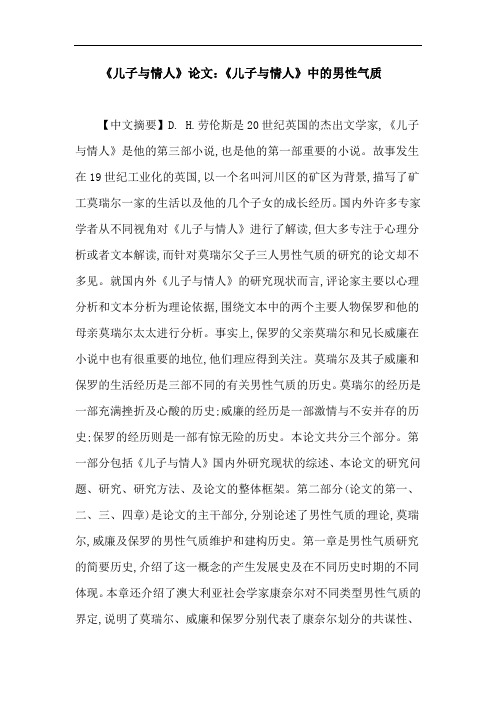
《儿子与情人》论文:《儿子与情人》中的男性气质【中文摘要】D. H.劳伦斯是20世纪英国的杰出文学家,《儿子与情人》是他的第三部小说,也是他的第一部重要的小说。
故事发生在19世纪工业化的英国,以一个名叫河川区的矿区为背景,描写了矿工莫瑞尔一家的生活以及他的几个子女的成长经历。
国内外许多专家学者从不同视角对《儿子与情人》进行了解读,但大多专注于心理分析或者文本解读,而针对莫瑞尔父子三人男性气质的研究的论文却不多见。
就国内外《儿子与情人》的研究现状而言,评论家主要以心理分析和文本分析为理论依据,围绕文本中的两个主要人物保罗和他的母亲莫瑞尔太太进行分析。
事实上,保罗的父亲莫瑞尔和兄长威廉在小说中也有很重要的地位,他们理应得到关注。
莫瑞尔及其子威廉和保罗的生活经历是三部不同的有关男性气质的历史。
莫瑞尔的经历是一部充满挫折及心酸的历史;威廉的经历是一部激情与不安并存的历史;保罗的经历则是一部有惊无险的历史。
本论文共分三个部分。
第一部分包括《儿子与情人》国内外研究现状的综述、本论文的研究问题、研究、研究方法、及论文的整体框架。
第二部分(论文的第一、二、三、四章)是论文的主干部分,分别论述了男性气质的理论,莫瑞尔,威廉及保罗的男性气质维护和建构历史。
第一章是男性气质研究的简要历史,介绍了这一概念的产生发展史及在不同历史时期的不同体现。
本章还介绍了澳大利亚社会学家康奈尔对不同类型男性气质的界定,说明了莫瑞尔、威廉和保罗分别代表了康奈尔划分的共谋性、支配性边缘性的男性气质。
第二章是关于莫瑞尔受伤的男性气质。
首先论述了莫瑞尔太太如何尽力将丈夫的男性气质消解,及莫瑞尔如何尽最大努力来维护其共谋性男性气质。
其次论述了莫瑞尔家的子女们,在其母亲的教唆下,如何伙同他们的母亲将父亲的男性气质消解掉,及莫瑞尔怎样维护自己作为男性的尊严的。
第三章分析了威廉建构支配性男性气质的过程。
威廉从小就有建立支配性男性气质的雄心,其雄心得到了母亲充分的挖掘与培养。
儿子与情人读书报告

读书报告姓名:王晓琳班级:07英语一班学号:L0715101指导教师:韩玲Sons and LoversSons and Lovers was The third published novel of D.H. Lawrence, taken by many to be his earliest masterpiece tells the story of Paul Morel, a young man and a budding artist. This autobiographical novel is a brilliant evocation of life in a working class mining community. The original 1913 edition was heavily edited by Edward Garnett who removed eighty passages, roughly a tenth of the text. Despite this the novel is dedicated to Garnett. It was not until the 1992 Cambridge University Press edition that the missing text was restored.It is the first of David Herbert Lawrence’s major works, and is still considered to be one of his best .It was first published in 1913 London by Wyman and sons. Sons and Lovers was the first of Lawrence’s major works, and is still considered to be one of his best. The 1913 novel was partly autobiographical and was set in the coalmining village of Bestwood.Lawrence rewrote the work four times until he was happy with it. Although before publication the work was usually called Paul Morel, Lawrence finally settled on Sons and Lovers. Just as this changed title makes the work less focused on a central character, many of the latter additions broadened the scope of the work thereby making the work less autobiographical. While some of the edits by Garnett were on the grounds of propriety or style, others would once more narrow the emphasis back upon Paul. Sons and Lovers appears to really mean sons as lovers, and it is more appropriate for the book, because the sons are more lovers than sons.David Herbert Lawrence was born in 1885 in Nottinghamshire, England where his father was a miner. His experience growing up in a coal-mining family provided much of the inspiration for Sons and Lovers. Lawrence had many affairs with women in his life, including a longstanding relationship with Jessie Chambers (on whom the character of Miriam is based), an engagement to Louie Burrows, and an eventual elopement to Germany with Frieda Weekley. Lawrence began working on the novel in the period of his mother’s illness, and often exp resses this sense of his mother’s wasted life through his female protagonist Gertrude Morel. Letters written around the time of its development clearly demonstrate the admiration he felt for his mother - viewing her as a “clever, iron ical, delicately moulded woman”- and her apparently unfortunate marriage to his coal mining father, a man of “sanguine temperament”and instability. He believed that his mother had married below her class status. Ratherint erestingly, Lydia Lawrence wasn’t born into the middle-class. This personal family conflict experienced by Lawrence provided him with the impetus for the first half of his novel - in which both William, the older brother, and Paul Morel become increasingly contemptuous of their father - and the subsequent exploration of Paul Morel’s antagonizing relationships with both his lovers, which are both invariably affected by his allegiance to his mother.Lawrence’s first two novels, first play, and most of his early short stories, including such masterpieces as “Odour of Chrysanthemums” and “Daughters of the Vic ar” (collected in The Prussian Officer, and Other Stories, 1914), use earlyexperience as a departure point. Sons and Lovers carries this process to the point quasi-autobiography. The book depicts Eastwood and the Haggs Farm, the twin poles of Lawrence’s early life, with vivid realism. The central character, Paul Morel, is naturally identified as Lawrence; the miner-father who drinks and the powerful mother who resists him are clearly modeled on his parents; and the painful devotion of Miriam Leivers resembles that of Jessie Chambers. An older brother, William, who dies young, parallels his’s brother Ernest, who met an early death. In the novel, the mother turns to her elder son William for emotional fulfillment in place of his father. This section of the original manuscript was much reduced by Garnett before publication. Garnett’s editing not only eliminated some passages of sexual outspokenness but also removed as repetitive structural elements that constitute the establish ment of a pattern in the mother’s behaviour and that explain the plural nouns of the title. When William dies, his younger brother Paul becomes the mother’s mission an d, ultimately, her victim. Paul’s adolescent love for Miriam is undermined by his mother’s dominance; though fatally attracted to Miriam, Paul cannot be sexually involved with anyone so like his mother, and the sexual relationship he forces on her proves a disaster. He then, in reaction, has a passionate affair with a married woman, Clara Dawes, in what is the only purely imaginary part of the novel. Clara's husband is a drunken workingman whom she has undermined by her social and intellectual superiority, so their situation mirrors that of the Morels. Though Clara wants more from him, Paul can manage sexual passion only when it is split off from commitment; their affair ends after Paul and Dawes have a murderous fight, and Clara returns to her husband. Paul, for all his intelligence, cannot fully grasp his own unconscious motivations, but Lawrence silently conveys them in the pattern of the plot. Paul can only be released b y his mother’s death, and at the end of the book, he is at last free to take up his own life, though it remains uncertain whether he can finally overcome her influence. The whole narrative can be seen as Lawre nce’s psychoanalytic study of his own case, a y oung man’s struggle to gain detachment from his mother.The first draft of Lawrence’s novel is now lost and was never completed, which seems t o be directly due to his mother’s illness. He did not return to the novel for three months, at which point it was titled “Paul Morel”. The penultimate draft of the novel coincided with a remarkable change in Lawrence’s life, as his health was thrown into tumult and he resigned his teaching job in order to spend time in Germany. This plan was never followed, however, as he met and married the German minor aristocrat, Frie da Weekley. According to Frieda’s account of their first meeting, she and Lawrence talked about oedipus and the effects of early childhood on later life within twenty minutes of meeting.The third draft of “Paul Morel”was sent to the publishing house heinemann, which was repulsively responded to by William Heinemann himself. His reaction captures th e shock and newness of Lawrence’s novel, “the degradation of the mother [as explored in this novel], supposed to be ofgentler birth, is almost inconceivable”, and encouraged Lawrence to redraft the novel one more time. In addition to altering the title to a more thematic “Sons and Lovers”.Heinemann’s response had reinvigorated Lawrence into vehemently defending his novel and its themes as a coherent work of art. In order to justify its form Lawrence explains, in le tters to Garnett, that it is a “great tragedy”and a “great book”, one that mirrors the “tragedy of th ousands of young men in England”.Sons and Lovers contains many autobiograp hical details. Many of Lawrence’s novels were very controversial because of their frank treatment of sex, and both The Rainbow and Lady Chatterley’s Lover were banned during his lifetime. This controversial treatment of sex is ev ident as well in Sons and Lovers; Lawrence’s fear of negative public opinion may have been one reason for his vague use of language and the obscure treatment of sex i n the novePerhaps Sigmund Freud’s most celebrated theory of sexuality, the Oedipus complex takes its name from the title character of the Greek play Oedipus Rex. In the story, Oedipus is prophesied to murder his father and have sex with his mother (and he does, though unwittingly). Freud argued that these repressed desires are present in most young boys. (The female version is called the Electra complex.) Sons and Lovers tells the story of Paul Morel, a young man and a budding artist, this autobiographical novel is a brilliant evocation of life in a working class mining community.The refined da ughter of a “good old burgher family” Gertrude Coppard meets a rough-hewn miner at a Christmas dance and falls into a whirlwind romance. But soon after her marriage to Walter Morel, she realizes the difficulties of living off his meager salary in a rented house. The couple fight and drift apart and Walter retreats to the pub after work each day. Gradually, Mrs. Morel’s affections shift to her sons, beginning with the oldest, William.As a boy, William is so attached to his mother that he doesn’t enjoy the fair without her. As he grows older, he defends her against his father’s occasional violence. Eventually, he leaves home for a job in London, where he begins to rise up into the middle class. He is engaged, b ut he detests the girl’s superficiality. He dies, and Mrs. Morel is heartbroken, but when Paul catchpneumonia, she rediscovers her love for her second son. Both repulsed by and drawn to his mother, Paul is afraid to leave her but wants to go out on his own, and needs to experience love. Gradually, he falls into a relationship with Miriam, a farm girl who attends his church. The two take long walks and have intellectual conversations about books, but Paul resists, in part because his mother looks down on her. At work, Paul meets Clara Dawes, who has separated from her husband, Baxter.Paul leaves Miriam behind as he grows more intimate with Clara, but even she cannot hold him, and he returns to his mother. When his mother dies soon after, he is wrence summarised the plotin a letter to Edward Garnett on 12 November 1912:It follows this idea: a woman of character and refinement goes into the lower class, and has no satisfaction in her own life. She has had a passion for her husband, so her children are born of passion, and have heaps of vitality. But as her sons grow up she selects them as lovers — first the eldest, then the second. These sons are urgedinto life by their reciprocal love of their mother — urged on and on. But when they come to manhood, t hey can’t love, because their mother is the strongest power in their lives, and holds them. It’s rather like Goethe and his mother and Frau von Stein and Christiana — As soon as the young men come into contact with women, there’s a split. William gives his sex to a fribble, and his mother holds his soul. But the split kills him, because he doesn’t know where he is. The next son gets a woman who fights for his soul — fights his mother. The son loves his mother — all the sons hate and are jealous of the father. The battle goes on between the mother and the girl, with the son as object. The mother gradually proves stronger, because of the ties of blood. The son decides to leave his soul in his mother's hands, and, like his elder brother go for passion. He gets passion. Then the split begins to tell again. But, almostunconsciously, the mother realises what is the matter, and begins to die. The son casts off his mistress, attends to his mother dying. He is left in the end naked of everything, with the drift towards death. This is the most autobiographical of all Lawrence’s works as the author himself had a similar relationship with his own mother. The use of this oedipal theme is one of a number of Freudian concepts he used throughout his books. Like many of his works, Sons and Lovers was criticized when first published for obscenity and one publisher called it “the dirtiest book he had ever read” but compared to his later works it is quite constrained.and Lovers is divided into three parts. The hero of the book, Paul Morel is the second son of a miner family. His mother, a woman of character and refinement goes into the lower class, and has no satisfaction in her own life. She has had a passion for her husband, her children are born of passion, and have heaps of vitality. But because of the differences in family background and education, a shadow is soon cast upon the married life of Mrs. Morel. And the shadow is darked by Mr. Morel’s laziness and alcoholism. As her sons grow up she selects them as lovers-first the eldest, then the second. These sons are urged into life by their reciprocal love of their mother-urged on and on. But when they come to manhood, they can’t love, because their mother is the strongest power in their lives, and holds them. It’s rather like Goethe and his mother and Frau Von stein and Christi ana-as soon as the young men come into contact with women, there’s a split. William gives his sex to a fribble, and his mother holds his soul. But the split kills him, because he doesn’t know where he is. The next son gets a woman who fights for his soul-fights his mother. The son loves his mother-all the sons hate and are jealous of the father. The battle goes on between the mother and the girl, with the son as object. The mother gradually proves stronger, because of the ties of blood. The son decides to leave his soul in his mother’s hands, and like this elder brother go for passion. After the deathof her first son, William, because of the hard work and pneumonia, Mrs. Morel divided attention and love is poured completely upon Paul. The mother’s abnormal love robs Paul of his normal love for his girl friend, the split begins to tell again. But almost unconsciously the mother realizes what is the matter, and begins to die. The son casts off his mistress, attends to his mother dying. He is left in the end naked of everything, with the drift towards death.Paul assuages his guilty, incestuous feelingsby transferring them elsewhere, and the greatest receivers are Miriam and Clara (note that transference is another Freudian term). However, Paul cannot love either woman nearly as much as he does his mother, though he does not always realize that this is an impediment to his romantic life. The older, independent Clara, especially, is a failed maternal substitute for Paul. In this setup, Baxter Dawes can be seen as an imposing father figure; his savage beating of Pa ul, then, can be viewed as Paul’s unconsciously desired punishment for his guilt. Paul’s eagerness to befriend Dawes once he is ill (which makes him something like the murdered father) further reveals his guilt over the situation. This is the most autobiographical of all Lawrence’s works as the author himself had a similar relationship with his own mother. The use of this oedipal theme is one of a number of Freudian concepts he used throughout his books. Like many of his works, Sons and Lovers was criticized when first published for obscenity and one publisher called it “the dirtiest book he had ever read” but compared to his later works it is quite constrained.Sons and Lover s was D.H. Lawrence’s first major novel. His only major novel, some would say; but even readers who are out of sympathy with him, or who feel that his gifts were not really those of a novelist, have usually been happy to make a wholehearted exeception in this one case.It is a book that goes straight to the point, at the outset and at almost every subsequent stage. Between them his two methods leave us in no doubt where the heart of his story is to be located.Gertrude Morel is a woman of high priciples, of character and refinement. Her husband is a miner who can barely read and write. Marrying him for passion, she is bitterly disappointed by his rough manners, his drinking, what she can only see as his weakness and irresponsibility. When the book opens, the marriage has already turned into a battlefield, and the love she has withdrawn from Morel is being redirected toward the first of her children. Such is the world into which Paul Morel is born.“Never trust the artist, trust the tale.”---here, as so often,his own maxim seems sound advice. There is no reason to suppose that Sons and Lovers would have been a better book if Lawrence had made Paul an aspiring author, but it would no doubt have been a more literary one. We might have seen more evidence,for example, of the remarkable couse of reading that Lawrence undertook together with Jessie Chambers. We might even have learned something of how he developed his style.Lawrence adds a twist to the Oedipus complex: Mrs. Morel is saddled with it as well. She desires both William and Paul in near-romantic ways, and she despises all their girlfriends. She, too, engages in transference, projecting her dissatisfaction with her marriage onto her smothering love for her sons. At the end of the novel, Paul takes a major step in releasing himself from his Oedipus complex. He intentionally overdoses his dying mother with morphia, an act that reduces her suffering but also subverts his Oedipal fate, since he does not kill his father, but his mother. l Initially, I was not sure that I would like this book, but with each page that I read, I became more and more involved in the story. It was an excellent read and shows how manipulative a mother can be in controlling her children. The psychological hold that she had onher sons was something that they were not able to break. It also shows how influenced we can be by the interaction between our own parents.D.H. Lawrence was aware of Freud’s theory, and Sons and Lovers famously uses the Oedipus complex as its base for exploring Paul’s relationship with his mother. Paul is hopelessly devoted to his mother, and that love often borders on romantic desire. Lawrence writes many scenes between the two that go beyond the bounds of conventional mother-son love. Completing the Oedipal equation, Paul murderously hates his father and often fantasizes about his death.At first,I was not sure that I would like this book, but with each page that I read, I became more and more involved in the story. It was an excellent read and shows how manipulative a mother can be in controlling her children. The psychological hold that she had on her sons was something that they were not able to break. It also shows how influenced we can be by the interaction between our own parents.。
《《儿子与情人》中的家庭关系与禁忌爱情主题:D·H·劳伦斯的现代主义小说》

儿子与情人中的家庭关系与禁忌爱情主题引言D·H·劳伦斯的现代主义小说《儿子与情人》是一部充满争议和引人深思的作品,其中对于家庭关系和禁忌爱情的描写尤为突出。
本文将探讨该小说中家庭关系以及禁忌爱情这一主题,并从不同角度分析作者的刻画手法和意图。
家庭关系的呈现《儿子与情人》中,家庭关系扮演着重要角色,展示了当时社会上普遍存在的矛盾和问题。
首先,小说揭示了传统家庭结构对个体自由发展造成的限制。
通过保罗与母亲之间复杂而紧密的连接,反映了社会对于子女在成年后仍然依赖父母及其矛盾心理状态。
其次,在《儿子与情人》中,作者描绘了一个苦恼、冷漠、紧张而缺乏沟通的家庭环境。
保罗充满对母亲之爱以及压抑感受,在家庭内外扮演多重角色,与父亲尤其形成鲜明对比。
此外,小说还揭示了家庭关系中的性别问题。
母子之间的纠缠情感暗示着社会中存在的男性焦虑和女性乏力。
在这个家庭中,母亲的权威和保罗的依赖关系凸显出传统家庭结构制约下对男性自我认同以及心理成长造成的影响。
禁忌爱情主题的探讨《儿子与情人》以其突出的禁忌爱情主题而闻名。
故事中,保罗不仅与母亲之间存在近乎病态的依赖关系,还陷入了他和其他女性之间复杂而禁忌的爱恋。
作者通过描写这种违反社会道德、超越常规界限的禁忌爱情,并通过保罗内心躁动不安、挣扎痛苦来呈现出这一主题。
在小说中,劳伦斯以细腻描绘了保罗和米里阿姬之间微妙而充满吸引力的爱情关系。
他们超越了血缘关系所带来的道德禁忌,勇敢地追求自己内心的欲望。
但这种禁忌爱情注定会带来痛苦和破碎。
作者的刻画手法与意图劳伦斯以其深入而细腻的描写方式,将家庭关系和禁忌爱情表现得栩栩如生。
他通过人物形象、对话和内心独白等手法,传递了对于家庭关系困境和禁忌爱情困扰的真实感受。
作者通过刻画保罗的复杂性和冲突性格,展示了一个渴望自由以及追求幸福的年轻人。
同时,他也在无声中指向了当时社会约束所带来的限制和压抑。
劳伦斯在该小说中并非单纯追求震撼和争议,而是试图唤起读者对于家庭关系、个体解放以及社会道德约束的思考。
儿子与情人英国作家DH劳伦斯的作品探讨家庭与性欲

儿子与情人英国作家DH劳伦斯的作品探讨家庭与性欲儿子与情人:英国作家DH劳伦斯的作品探讨家庭与性欲DH劳伦斯是20世纪英国著名作家,他的作品以深入的情感描写和对性关系的探讨而闻名。
其中,他的小说《儿子与情人》(Sons and Lovers)尤为著名,深入剖析了家庭与性欲之间的复杂关系。
本文将从不同角度解读《儿子与情人》,探讨劳伦斯如何通过这部作品探讨家庭与性欲之间的纠葛。
一、父子关系的冲突《儿子与情人》以保罗与他的母亲莉叶为中心,表现了他们之间复杂的纠葛。
小说中,保罗对母亲怀有过于亲密的情感,甚至有些过分依赖。
这导致他与父亲之间产生了矛盾与冲突。
劳伦斯通过细腻的描写,展现了家庭关系中潜藏的性欲成分,以及因此引发的家庭纠纷。
二、母爱的占有欲与性欲莉叶对保罗的爱超出了一般母亲的范畴,可以说是一种占有欲的母爱。
她通过对儿子细腻的呵护和无微不至的关怀,满足了自己的性欲需求。
而保罗由于缺乏和母亲以外的女性接触,对母爱逐渐产生了异样的情感,这使得母子关系变得扑朔迷离。
三、性欲对家庭和谐的破坏劳伦斯通过描写莉叶与其他男性的关系,以及保罗与一位年轻女子的爱情纠葛,展现了性欲对家庭和谐的破坏力。
性欲的存在使得家庭成员无法真正实现精神上的交流和理解,造成心理上的分离与隔阂。
同时,性欲也使得人们无法保持对家庭的忠诚,难以遵守传统的家庭规范,进一步加剧了家庭的矛盾。
四、性欲与自我意识的觉醒小说中的主要人物保罗逐渐从与母亲的关系中觉醒出来,开始追求自己的独立与自由。
他通过与一位名为米兰达的女性的爱情关系,发现了自己与其他女性之间的性吸引力。
他开始探索自己的性欲,并找到了性爱与自我意识觉醒之间的联系。
综上所述,《儿子与情人》是DH劳伦斯对家庭与性欲关系探讨的重要作品。
通过对主人公保罗与其母亲、情人之间关系的描写,劳伦斯深入探讨了家庭与性欲之间的纠葛。
这一作品不仅仅是对个体情感的描述,更是对当时英国社会的一种抨击与反思。
劳伦斯以其独特的方式展现了人性复杂的一面,引起了人们对家庭与性欲关系的深思。
《儿子与情人》亲情与爱情的选择

1 2
情人的角色
情人作为儿子的爱情对象,她的出现打破了母子 之间的情感平衡,促使儿子对爱情和亲情进行深 刻反思。
其他家庭成员的角色
其他家庭成员的存在丰富了故事的情感层次,他 们的行为和态度对儿子的情感选择产生了影响。
3
社会环境的角色
社会环境作为故事背景,为角色塑造提供了依据 ,同时也对角色的行为和选择产生了影响。
。
社会道德观念的束缚
小说中人物在追求自由和幸福的过程中,往往受到社会道 德观念的束缚和压迫,反映了当时社会道德观念的僵化和
保守。
对现代家庭关系启示和思考
建立健康的家庭关系
01
小说提醒我们注意家庭关系中的健康与平衡,避免过度控制或
依赖,建立基于尊重、理解和信任的家庭关系。
追求真爱与幸福
02
小说鼓励人们追求真爱和幸福,摆脱功利因素的影响,关注内
05
社会影响与现实意义
对当时社会现象反映和批判
家庭关系的扭曲
小说中展现了家庭关系的复杂性和扭曲现象,如父母对子 女的过度控制、子女对父母的依赖等,反映了当时社会家
庭关系的普遍问题。
爱情与婚姻的功利性
小说中人物的爱情和婚姻往往受到社会地位、金钱等功利 因素的影响,揭示了当时社会对爱情和婚姻的功利化倾向
04
艺术手法与审美价值
现实主义手法运用
刻画真实生活场景
小说通过对家庭、社会环境的细致描绘,展现了当时英国工业小镇 的生活风貌。
塑造典型人物
作品中的人物形象鲜明,具有代表性,如母亲莫瑞尔太太的溺爱、 儿子保罗的挣扎等,都反映了现实生活中人们的真实情感和困境。
深刻的社会洞察
作品揭示了家庭、婚姻、爱情等社会问题,对人性进行了深刻的探讨 。
劳伦斯《儿子与情人》开题报告(定稿)

笔者认为,研究该选题的意义就在于以下三个方面:第一,劳伦斯在《儿子与情人》中描写保罗的悲剧时采用了丰富的人物心理描写,研究该选题有利于我们了解劳伦斯在这部小说中是如何运用这一手法的;第二,保罗的悲剧发生在英国的维多利亚时期,研究该选题可以使我们了解当时的社会背景;第三,对保罗的悲剧的研究有着重要的社会现实意义,研究该选题可以使我们对现代机器带来的人际关系问题、家庭问题进行深思,对建设和谐家庭、社会有很大的启示意义。
二、框架:论《儿子与情人》中男主人公保罗的悲剧
引言
1.1劳伦斯生平及《儿子与情人》介绍
1.2文献综述
2.保罗的“恋母情结”
2.1“恋母情结”的内涵
2.1.1“恋母情结”的起源
2.1.2弗洛伊德关于“恋母情结”的理论
2.2保罗“恋母情结”的成因
2.2.1社会时代背景因素
2.2.2家庭因素
2.2.3保罗个人因素
由于《儿子与情人》是一部心理分析型小说,因此从心理学角度分析这部小说是近年来西方不少学者采用的方法。著名学者格•霍尔德内斯在《wrence历史、思想意识与虚构》一书中说“应该用唯物主义考察文学现象”。因为“俄狄蒲斯情结”是小说中的一重大主题,所以从心理学角度分析恋母情结形成成为近来西方学者的选择。
在笔者看来,以上这些研究仍不够全面,现有研究的不足之处主要体现在以下几个方面:
1、研究时应加强对国外相关研究成果的翻译和引进,尤其是作家本国学者对其作品的研究,而不应局限于国内。
2、研究的角度应平均化、多样化,研究的深度应该拓展。在研究保罗的悲剧产生因素时不应局限于心理学角度,社会角度,还应继续深入探讨。在这类研究中,学者们应添加更多的价值判断,而不只是列举。
2.1.1 Origin of“Oedipus Complex”
《儿子与情人》中的男性气质的开题报告

《儿子与情人》中的男性气质的开题报告题目:《儿子与情人》中男性气质的分析摘要:在现代社会,男性气质往往被认为是强硬、自信和有决策力的代表。
然而,在电影《儿子与情人》中,男性气质却呈现出复杂、矛盾和脆弱的一面。
本篇论文从主角罗地的角度,探讨在文化背景、个人经历以及情感关系等方面如何形成和展现出这种男性气质。
全文:一、男性气质的文化背景电影《儿子与情人》讲述了一位英俊、聪明、却风流倜傥的年轻男人罗地与他妈妈之间的较量。
罗地被视为一位成功的青年,但也不可避免地受到了社会文化背景的影响。
在32岁的年龄,罗地已经具备了社会上大多数人理想的条件,他是一位成功的中年商人,对生意的经营非常专注。
同时,他还拥有优秀的外貌和出色的语言表达能力,受到了周围人的崇拜。
从这种背景上看,罗地具备一种自信、优雅、高傲的形象,他所展现出的男性气质是社会文化期望中的体现。
然而与此同时,电影的制作更着重描绘了罗地的内在心理和情感经历。
在他与自己的母亲之间的争斗中,罗地表现出了青涩、脆弱、寂寞和无助等特点,这种男性气质不符合社会期望,更注重表现男性在情感层面上的复杂性。
二、罗地的个人经历从罗地的个人经历上看,他的父亲早逝,只与自己的母亲生活在一起,这在一定程度上造成了他的缺陷。
他的母亲一直依赖他,希望他陪伴自己度过晚年,并且对自己的生意专攻不分有所不满。
罗地从小就缺乏父亲的温暖和榜样的引导,这无疑加重了他自我形象的建立。
因此,他往往以一种闪耀的表象来掩盖他心理上的脆弱,表现出了一种控制欲望以应对人际关系的困扰。
另一方面,由于自己曾经被迫走过性少数派的路,罗地对自己的性取向有着很大的疑惑和压抑。
电影在展现罗地与情人之间的情感时,更多地呈现的是他心理上的彷徨和无助。
他在自己的人生中经历了自我的发现、抑制、挣扎和反叛,并且随着剧情的深入,他逐渐认识到自己内在世界的真实感受。
这种男性气质不是从社会认可标准中塑造的,而是从个人的成长经历中形成的。
《儿子与情人》的生态解读的开题报告
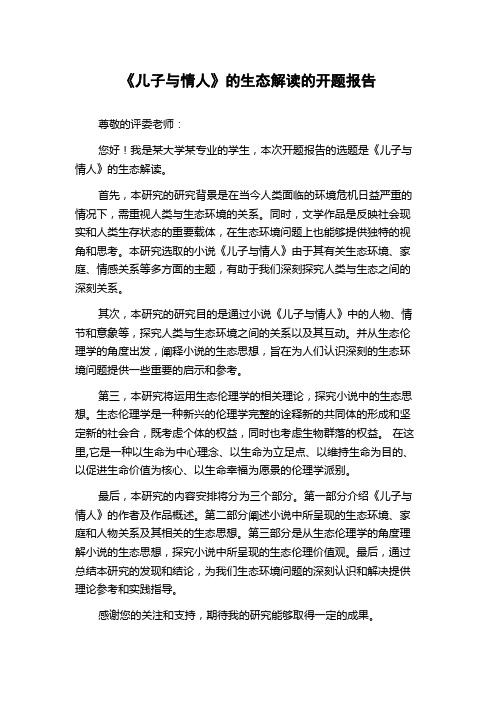
《儿子与情人》的生态解读的开题报告
尊敬的评委老师:
您好!我是某大学某专业的学生,本次开题报告的选题是《儿子与情人》的生态解读。
首先,本研究的研究背景是在当今人类面临的环境危机日益严重的情况下,需重视人类与生态环境的关系。
同时,文学作品是反映社会现实和人类生存状态的重要载体,在生态环境问题上也能够提供独特的视角和思考。
本研究选取的小说《儿子与情人》由于其有关生态环境、家庭、情感关系等多方面的主题,有助于我们深刻探究人类与生态之间的深刻关系。
其次,本研究的研究目的是通过小说《儿子与情人》中的人物、情节和意象等,探究人类与生态环境之间的关系以及其互动。
并从生态伦理学的角度出发,阐释小说的生态思想,旨在为人们认识深刻的生态环境问题提供一些重要的启示和参考。
第三,本研究将运用生态伦理学的相关理论,探究小说中的生态思想。
生态伦理学是一种新兴的伦理学完整的诠释新的共同体的形成和坚定新的社会合,既考虑个体的权益,同时也考虑生物群落的权益。
在这里,它是一种以生命为中心理念、以生命为立足点、以维持生命为目的、以促进生命价值为核心、以生命幸福为愿景的伦理学派别。
最后,本研究的内容安排将分为三个部分。
第一部分介绍《儿子与情人》的作者及作品概述。
第二部分阐述小说中所呈现的生态环境、家庭和人物关系及其相关的生态思想。
第三部分是从生态伦理学的角度理解小说的生态思想,探究小说中所呈现的生态伦理价值观。
最后,通过总结本研究的发现和结论,为我们生态环境问题的深刻认识和解决提供理论参考和实践指导。
感谢您的关注和支持,期待我的研究能够取得一定的成果。
英语专业毕业论文—《儿子与情人》的主题分析
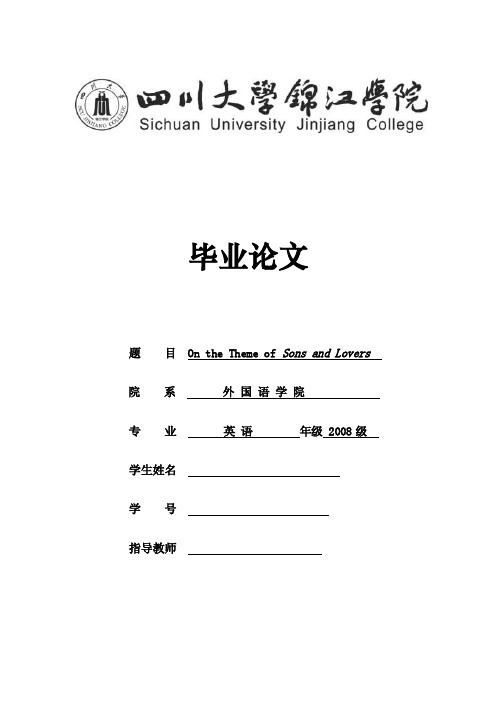
毕业论文题目 On the Theme of Sons and Lovers 院系外国语学院专业英语年级 2008级学生姓名学号指导教师On the Theme of Sons and Lovers论《儿子与情人》的主题学生指导教师摘要:《儿子与情人》是劳伦斯早期作品中最著名的一部,也是他的成名作。
尽管此书曾遭受过被禁的厄运,但在其解禁至今的几十年内引起了读者的关注,并获得了文学上的肯定。
书中,劳伦斯逼真地再现了20世纪初英国矿工家庭的生活,并揭示了在工业文明的影响下,人们为争取更高的经济和社会地位所付出的惨痛代价。
小说以主人公保罗的家庭本身及自己的情感生活为中心,着重描写了人物内心强烈深沉的情感,以及人与人之间在那个社会环境下不能自已的爱恨情仇。
本论文试图从莫瑞儿一家的不幸生活来对《儿子与情人》的主题进行较为详细深刻的分析,比如:夫妻失和导致莫瑞尔太太的情感转移;一直引以为傲的大儿子的死带给母亲的巨大打击;保罗接替威廉成为莫瑞尔太太生命的全部;由于母亲从小对儿子们倾注所有,并在其思想上有一定的控制,因此导致儿子们无法拥有一段正常的,成功的恋爱生活等等。
而这一系列情感悲剧的真实根源来自于工业文明下诸多的社会问题以及不和谐的人际关系,这也同样是本文的最终主题。
关键词:劳伦斯;《儿子与情人》;畸形母爱;恋母情结;工业文明ABSTRACTSons and Lovers is the one of the most significant works of David Herbert Lawrence as well as his first big success. Although this book once suffered being prohibited, it drew readers' attentions and gained recognitions in literature rapid ly in a few decades after being rescind the prohibition. In this book, Lawrence realistically reproduces a British miner's family life in the twentieth century with realistic technique, and exposes that in order to strive for higher economic and social sta tus, people needs to pay a heavy price under the influence of industrial civilization. The novel mainly depicts the deep and intense emotion in people's inner world, and focuses on the love and hatred between people which they cannot control under that social circumstance, with the protagonist's family itself and his love life as its center. Therefore, this thesis attempts to analyze the theme of Sons and Lovers in detail from the Morels' misfortunes, such as the failed marriage results in Mrs Morel's shift in sentiment; the death of William who is always the hope of his mother brings about a huge blow to Mrs. Morel; Paul becomes the whole of his mother's life instead of William; Mrs.Morel's devotions to her sons and controls of their minds result that they fail to possess normal and successful love lives and so on. While, the roots of the series of tragedies are the social problems and disharmonious relations brought about by the industrial civilization , which is also the theme of Sons and Lovers.Key W ords: wrence; Sons and Lovers; deformed Love; Oedipus complex; industrial civilizationContentsIntroduction (1)Part I A Failure in Marriage (4)1.1 Mrs. Morel's Dream of Marriage (4)1.2 A Marriage of Love and Hatred (4)1.3 Mrs Morel's Changed Attitude to Her Husband (5)Part II Mrs Morel, William and His Girl Friend (7)2.1 William's Social Success (7)2.2 William and His Girl Friend (7)2.3 Mrs. Morel's View of William's Death (8)Part III Mrs. Morel, Paul and Miriam (10)3.1 Mrs. Morel's Expectation of Paul (10)3.2 Miriam's Influence on Paul (11)3.3 Mrs. Morel's Dislike of Miriam (12)Conclusion (14)Bibliography (16)Acknowledgments (17)四川大学锦江学院本科毕业论文论《儿子与情人》的主题IntroductionDavid Herbert Lawrence is one of the most unique and controversial English writer s in the twentieth century, whose masterpieces are Sons and Lovers, The Rainbow, Women in Love, and Lady Chatterley's Lovers. He was born in a miner family without notable reputation and high diploma. What makes him so distinctive is his talent. His creations are deeply influenced by family background and Sigmund Freud's psychoanalysis, which result in the fact that his works are mostly exploring family, marriage and sex. What is more, Lawrence’s bold descriptions of sex in his books once triggered off a tremendous splash and were forbidden for a long time. Therefore, he complained that nobody could understand his writings in three hundred years (wrence). For Lawrence, he insisted that the fade of sex led to spiritual barrenness and un-civilization of English, and Britain would not come back to life until letting sex return to its natural condition (毕冰宾). After the prohibition against his works was rescinded, he soon became popular and welcomed by general public.Sons and Lovers is one of Lawrence's most important novels, which is regarded as an autobiographical novel and breaks the writing conventions of the former writers. He depicts the protagonists' complicated inner world from his special view, lyrical style, vivid details, and bold idea s. It is not only a novel presenting the author's real life, revealing the ugliest aspect s of society in nineteenth and twentieth centuries, of all round dirty mines and miners' miserable conditions, but also exposing various contradictions and problems arising with the development of capitalistic industrial civilization, of distorted human relationships and negative physical and mental influence on human beings (张文静). Therefore, this novel is a masterwork in English literary history and world literature that is worth exploring.Some scholars focus on Mrs. Morel's deformed love for Paul. Mrs. Morel is a well-educated woman from a middle class family, so her marriage with Mr. Morel – a miner with coarse speech and bad temper –dooms to be a failure. After her disappointment of her husband and desperation of her marriage, Mrs. Morel devotes1all her love to her children. Therefore, Paul becomes her only hope and emotional trust after William's death. She not only continuously encourages and supervises Paul to edge into the middle classes and polite society, but also controls him in spirit and interferes with his courtship. Because in her eyes that Paul is her lover, and is part and parcel of her life, which satisfies her emotional need of not just being a mother, but also a wife and a woman. However, both of them are suffering from this kind of possessive love (甄桂英;尹树文;杨琳).Some scholars focus on Paul's Oedipus complex. As a psychoanalytic theory of Sigmund Freud, Oedipal Complex means a boy's desire to possess his mother sexually and oppose to his father in an unconscious way. Oedipus Complex derives from a Greek mythology in the fifth century B. C.. It tells that the king of Thebes, Oedipus, unwittingly kills his father and marries his mother, then brings disaster on his city and family (Oedipus). While, in Sons and Lovers, it mainly depicts the lingering feeling of love between the mother and the son. Paul’s emotional attachment to his mother is generally regarded as Oedipus complex. Mrs. Morel's control of Paul's soul and feelings, and her abnormal mother love accepted by Paul result in that he is largely dependent on his mother. On one hand, he is a boy who is sensitive to mother's troubles and likes staying even sleeping with her. He is also full of responsibility to her. Because of this, he often curses his father to die. On the other hand, he indulges in the Oedipus complex too deep to get rid of his mother's fatal influences when he dates with his girl friend. And he cannot really fall in love with anyone. Therefore, he gradually realizes that he is unable to get married only if his mother is alive (刘国英;李晋瑜;程明静, 卓杨;王毅).Some scholars focus on the root of family tragedy of the industrial civilization. The early twentieth century of Britain was a period of industrial revolutio n. At that time, the majority of people were happy for the huge profits and economy growth. D.H. Lawrence, however, realized the destructiveness. He believed that industrial civilization improved the human beings' material civilization, but at the same time seriously destroyed the original harmonious relation between people,suppressed the human nature, ruined the person's physical and mental health. In Sons and Lovers, allkinds of distorted human relationships are resulted from those unharmonious elements of modern civilization. And a series of tragedies are produced like the "domino effect". The industrial civilization puts Mr. Morel, a miner, in a tough living conditions. Under the great pressure of life, his marriage is at risk. Facing the massive differences between the before-marriage and the after-marriage, as well as the ideal and the reality, Mrs. Morel estranges her husband but gets close to her sons, which leads to excessive intimate mother-child relationships. Then the intricate family ties deprive the sons of abilities to fall in love with other girls normally. Therefore, the tragedy of last generation extends to the next generation. That's why we can say industrial civilization is the evil root (刘国英;张文静;武瑞).In my opinion, the theme of Sons and Lovers is involved in the abnormal interrelationships and their main causes.Part I A Failure in Marriage1.1 Mrs. Morel's Dream of MarriageMrs. Morel is a well-educated lady with pious faith. In a Christmas ball, she falls in love with the handsome and humorous Walter Morel, and then they get married. Because of different family and educational backgrounds, they are also different in outlook on life (覃艳容)."Mrs. Morel came of a good old burgher family, famous independentswho had fought with Colonel Hutchinson, and who remained scoutCongregationalist...Gertrude resembled her mother in a small build. Buther temper, proud and unyielding, she had from the Coppards "(Lawrence6).What's more, Mrs. Morel's ideal type husband should like her father who is a cultured gentleman with masculinity and belief. "Her father was to her the type of all men "(Lawrence 8). Therefore, she is fascinated when she meets the "well set-up, erect, and very smart"(Lawrence 7). Walter Morel. And she expects to marry a miner who is full of charm and vigor, with independent economy, own house and bank savings. But at the seventh month after marriage, she finds that her husband is a poor and indebted man. This accidental discovery shatters her dream (覃艳容).1.2 A Marriage of Love and HatredIt seems that the marriage between Mr. Morel and Mrs Morel is a tragedy, because both of them are suffering from it. On one hand, Mrs. Morel is disappointed with her husband who reconciles to ordinary life, wallows in enjoying life and makes no efforts to improve the living conditions and gain respects. She also hates him for drinking heavily, and being rude to her as well as the children."The pity was, she was too much his opposite. She could not be contentwith the little he might be; she would have him the much that he ought tobe. So, in seeking to make him nobler than he could be, she destroyedhim"(Lawrence 12).On the other hand, Mr. Morel can't withstand the request, arrogance and aggressiveness of his wife. He is just an ordinary miner who wants to live freely without too much luxury."She fought to make him undertake his responsibilities, to make himfulfill his obligations. But he was too different from her. His nature waspurely sensuous, and she strove to make him moral, religious. She tried toforce him to face things. He could not endure it-it drove him out of hismind"(Lawrence 11).However, we can still find couple's warmth and affection between them. For example, she defends for him before neighbors; she feels silly after quarreling with him for cutting William's hair; she experiences warmth and peace on the bed hearing the sound he made in the garden; she wants a kiss from him when she is giving birth; she still speaks highly of his nice figure even he is already a middle-aged man; she is so grieved for his illness."...she was almost a fanatic with him, because she loved him, or had loved him"(Lawrence 12). As for Mr. Morel, he is attracted by his wife all the time. Most times, he is afraid of her, and follows her directions. He feels sorry for scolding and beating her, sympathizes with her laborious business."During his illness his wife had spoilt him a little. Now he wanted her tocontinue. He often put his band to his head, pulled down the comers ofhis mouth, and shamed pains he did not feel"(Lawrence 32).For theses reasons, there are not only fights and contradictions, but also pleasant memories in this relationship. And just because love and hatred both exist in the marriage, their emotions are complex and agonizing.1.3 Mrs Morel's Changed Attitude to Her HusbandAfter marriage, the cruel reality shatters Mrs. Morel's dream as a young girl. She maintains the essential family living and raises her children up in a dreadful condition. At the same time, Mr. Morel is not a gentle and thoughtful man any more.With heavy manual work and burden of family life, he begins to drink heavily, be rude and unreasonable, and vents his anger on his wife and children. This triggers of a discordant and hostile relationship. Mrs. Morel gradually changes her attitudes to her husband along with the birth of children and the broken love.The first time she starts to change her attitude is that she sees through her husband's lies and knows what they live in now is a rented house. "She said very little to her husband, but her manner had changed towards him. Something in her proud, honorable soul had crystallized out hard as rock" (Lawrence 10). She is extremely lonely and sad for the disillusioned dream. So she despises her husband, and turns from him to the child. She cares very little that he does. Only, she scathes him with her satire on his return . And then they become emotionally estranged from each other.With the birth of their second child, Mrs. Morel doesn't crate trouble for herself by not fighting with him like before and not thinking of his hateful behaviors. Therefore, "there was a state of peace in the house for some time. Mrs. Morel was more tolerate of him, … Neither knew that she was more tolerate because she loved him less"(Lawrence 32). At this moment, Mrs. Morel's calm attitude is not yielding to her husband or marriage, but giving up, because love is ebbing in an unspectacular way.The last change is the end of their love and marriage. Mrs. Morel no longer spends time in arguing uselessly with him. She shows him completely indifference and unconcern which drives out him from her world, then devotes to two sons with her life. As one proverb says that the opposite of love is not hatred, but unconcern. This time, Mr. Morel has a feeling of being abandoned, and realizes that "it was really over between them"(Lawrence 33).Part II Mrs Morel, William and His Girl Friend2.1 William's Social SuccessWilliam is the eldest son in the Morel family who is brilliant and excellent. He is always the proud of his parents from childhood, and gains social success by tirelessly pursuing his ideal life. At the age of thirteen, he begins his first job. Then he becomes one of the best stenographers and bookkeepers. In his nineteen, he gets a job in Nottingham for thirty shillings a week which is admired by neighbors,but he still studies till very late. Finally he finds a job in London with one hundred and twenty pounds per year which is a huge amount of income."In London he found that he could associate with men far above hisBestwood friends in station...so he began to fancy himself as a great gun.He was, indeed, rather supervised at the ease with which he became agentleman"(Lawrence 63).Although his living environment is rather poor, and family is unhappy, he enters into the gentry class all the same by his own. He can make friends everywhere for his extroverted character, and challenge authority for his sense of justice. He can do all the things that men do-the decent things (Lawrence 37). What's more, he can give dual attention on enjoyment and learning. All of these contribute to his social success.2.2 William and His Girl FriendWilliam is deeply loved by Mrs. Morel for his excellence, and wants to get rid of the trammel of motherly love. So the courtship becomes the only way to save him. He begins to pursue a Gypsy girl, Lily, who is beautiful in appearance but simple in mind, and is even engaged with her despite his mother's opposition. William should be happy at this moment, but he feels a strong sense of complications and contradictions in the love between his girl friend and him.On one hand, William is always accompanied by his mother and influenced by her complicated character, arrogance and stubbornness. In addition to that he reads alot of books, and he looks down upon the foolishness and decadence of the upper class. Lily understands nothing except for amorism and following fashion. "But often he got irritable. She had brought, for an eight-days' stay, five dresses and six blouses".(Lawrence 91) So William has a deep aversion to his fiancée with the expectation of a kindred spirit, not a noisy lover who just regards him as a machine to pay her bills. Besides, he never makes disguise of his disdain and scorn to Lily in front of his mother, and even digs at her to his mother's face. "Read a book! Why, she's never read a book in her life" (Lawrence 92). On the other hand, he inherits his father's emotional side which let him yearn for the ardent and passionate love life. He can't resist Lily's fantastic appearance and treats her tenderly (刘芳).Just because William fails to reach the balance between reason and emotion, the love between his girl friend and him is also contradictory and torturous. We can get this from the description of Lawrence."William was silent, and later he repented, kissed and comforted the girl.Y et it was true, what he had said. He hated her...All summer longWilliam's letters had a feverish tone; he seemed unnatural and intense.Sometimes he was exaggeratedly jolly, while usually he was flat andbitter in his letter"(Lawrence 94).2.3 Mrs. Morel's View of William's DeathMrs. Morel gives lives to her sons who also naturally become the spokesmen of her life. So she takes for granted that sons' successes are her triumph. It likes a guaranty that sons' lives are mortgaged to their mother for being taught and guided. Then William is accepted by London's upper class soon which brings comfort and honor to her mother who is struggling in adversity. However, fate always likes to push people into the abyss when he is full of hope. William's short life is gone with wind without blossoming. After his death, Mrs. Morel is in a trance. And her hopes come to naught."In the house she was the same-small, white, and mute. She noticednothing, she said nothing...then she relapsed into the same mute lookinginto space...Mrs. Morel could not be persuaded, after this, to talk and takeher old bright interest in life. She remained shut off"(Lawrence 97-99).Although she is extremely upset, she never realizes the real cause of her son's death. She just thinks that he dies from overwork. Because, she knows that he is a hard-working boy, "and she knew he sat up afterwards in his cold bedroom grinding away at Latin, because he intended to get on his office, and in the law as much as he could".(Lawrence 64) Even the whispered words he says when he is dying is about his work.In fact, it's Mrs. Morel's excessive demand of emotion and dominance that causes this tragedy. And she never knows that her aggressive interference and sentimental infiltration give rise to the departure. On the one hand, he has to bear his profligate fiancée in material, and doubts her loyalty of love in spirit; on the other hand, he must endure his mother's control and occupation of his mind. This kind of pressure from body and mental leads to his death (章学文).Part III Mrs. Morel, Paul and Miriam3.1 Mrs. Morel's Expectation of Paul"Paul was rather a delicate boy, subject to bronchitis. The others were all quiet strong, so this was another reason for his mother's difference in feeling for him"(Lawrence 46). Especially, after the death of William, Paul becomes the only hope of Mrs. Morel who gives him all her love. "In him was established her life now. After all, the life beyond offered very little to Mrs. Morel. She saw that our chance for doing is here, and doing counted with her"(Lawrence 158). In addition to that she has a certain degree of cultural cultivation, so she eagerly hopes that her son can gain higher economic and social status. She urges him to work hard, be free of mining areas, and encourages him to prefer niceness, such as flowers, sunset or some beautiful gadget (刘积源). Besides, Paul also turns into her target of venting the inner world's anguish. Every night, she waits for his coming, unburdens herself and tells him what occurs in the whole day. She has mind control on him to stop him from loving another people, which can make up for her regret of having a disappointing husband and unhappy marriage that only exist in name. Therefore, Paul is not just his mother's son but also a lover to satisfy her both in material and spirit. Mrs. Morel expects Paul to realize all her unfilled dreams.With regarded to Mrs. Morel's expectations, Paul gives her enthusiastic response. He is largely dependent on her and extremely sympathizes with her sufferings from childhood. As long as he stays with her, he is full of love and responsibility. "...he also could not bear to go home to his mother empty. That, he felt, would disappoint her, and he would have died rather" (Lawrence 48). For these reasons, he hates his father who is an incapable husband, irritable drunkard, and destroys the family's happiness. Sometimes, he even curses his father to die. His ambition is that living with he mother in a small house where is not far away from home after her father passing away. Mrs. Morel occupies the most important place in Paul's heart and is the one he really loves.3.2 Miriam's Influence on PaulMiriam is Paul's first love who is a beautiful girl with curly black hair. She is shy and sensitive with strong religious faith. Even the slightest vulgar behaviour is an agony for her. Although she defies men, Paul commands her respect with a brand new image and a little learning. She is fascinated by him. Hence, she wants to build up a genuine and platonic relationship with Paul.There are pure appearance and source of ideas what an artist needs upon Miriam. Paul is always eager to show her his every piece of work after getting it done on account of that she will speak highly of his works all the time, even sometimes they are unintentional. Meanwhile, he can acquire a lager imaginary space when he is discussing the works with her. And with Miriam's encouragement, Paul's desire to paint is much more intense (张慧军). Plus, he also can talk about celebrities, poems and culture, exchange ideas with her, which enhances his insight and lets him have a more profound understanding of other things. In this regard, Miriam is different from Mrs. Morel who does not care about Paul's art but himself and his achievement. Miriam pays attention to the art itself, and his personality.In the process of dating with Miriam, Paul absorbs pure sense and soul exchange from her which are needed by personal growth. We can say that her love helps him heading for maturity in spirit (张慧军). Miriam is Paul's soul mate who gives him the spiritual comforts. But about sex, her religious faith leads her to consider it dirty and stick to the concept of virginity."...because of the continual business of birth and of begetting which goeson upon every farm, Miriam was the more hypersensitive to the matter,and her blood was chastened almost to disgust of the faintest suggestionof such intercourse" (Lawrence 115).So, Paul follows her and restrains his desire by all means. He is always in a detached state to transform his fire of love into the subtle consciousness. He would rather suffer from it than hurt her feelings, because the sacred sentiment of his mother is offended by his father. He won't let it happen again. However, in the bottom ofPaul's heart, the true love is not only in mind, but also in body. Hence, he is tortured by their platonic love and decides to leave her.3.3 Mrs. Morel's Dislike of MiriamMrs. Morel rests her hopes and affections on her sons through her disillusion of her husband. After the death of her beloved William, she devotes all efforts in Pa ul, which develops into a deformed motherly love. She takes great care of him in life, and regards him as a love object in spirit. She attempts to possess all his emotions. And she is very pleased to go out with him after freshening up shyly, which is the happiest moment in her life. In her eyes, Paul is her lover to fill her emotional vacancy and fulfill her aspirations. As a result, she is always on the alert to prevent anybody and anything from tempting him to deviate from the goal of life which is set by her. But before long, Miriam enters into their world and falls in love with Paul. Mrs. Morel has a feeling of hurt about Paul and hatred about Miriam immediately when they are together. So "She could not bear it when he was with Miriam. William was dead. She would fight to keep Paul" (Lawrence 158).Miriam is a girl with religious and charming temperament. Her platonic love controls Paul's mind to a certain degree. He goes to her home frequently and goes back late at night. He likes to stay and chat with her which let them grow very close. Mrs. Morel is irritated by all of these. She complains to Paul that "...I am old. And therefore I may stand aside; I have nothing more to do with you. Y ou only want me to wait on you-the rest is for Miriam"(Lawrence 151). And she hates Miriam who wants to possess Paul as she does. She feels that her son's soul is taken away by this girl and "She's not like an ordinary woman, who can leave me my share in him. She wants to absorb him"(Lawrence 136). Hence, she often bad-mouths Miriam before Paul and pours out her anguish. Besides, she even tells him that she never has a real husband to profess her love bluntly. In order to defeat Miriam completely, she does not oppose strongly to the fact that Paul is dating with another girl who is a couple of years older than her, because this woman presents no threat to her.Paul becomes increasingly impatient and sullen, as he is caught in the middle between Miriam and Mrs. Morel. He is cruel to Miriam and quarrels with his mother. Both of them are hurt. However, Mrs. Morel blames these negative changes on Miriam. She hates Miriam because she believes that this vicious girl changes Paul into this and destroys their happiness.Miriam is a devote believer and has an unrealistic attitude about life, which is contradictory to Mrs. Morel again who is a practical woman. Just as on the matter of Paul's artistic development, Miriam focuses on his art itself, while Mrs. Morel pays attention to the achievement that the art brings. Gradually, Paul begins to depend solely on Miriam along with his enhanced artistic level and excludes her mother in this respect, which turns into Mrs. Morel's another reason to hate Miriam (张思武).Mrs. Morel is an arrogant woman for her family background. So she hopes that her son can marry a notable maiden who is well-matched with him to consolidate his social position in the middle class. Miriam has a humble origin which is disdained by Mrs. Morel. And at last, Paul indeed doesn't marry Miriam and breaks up with her for several reasons. But Mrs. Morel's strong dislike for Miriam and her pressure on Paul must be much harder to ignore as their separation factors.ConclusionBritain experienced an industrial revolution in the nineteenth century, and entered into the era of industrial civilization. In society at that time, people's natural living environment was damaged, while flesh and spirit were suppressed and damaged. So the relations between people, especially the gender relations lost balance. Sons and Lovers mainly depicts a series of tragedies caused by the disharmonious gender relations under the industrial civilization in nineteenth century (庞炜).Mr. Morel is a miner who is struggling for a minimal living. After a long time of hard work bay by day, he is reduced to a slavery of industrial society without dignity and happiness. He becomes rude, insolent and an alcoholic binge. However, he marries a lady who is well-bred from middle class. She is resentful about her husband's rudeness and the family condition. Then couple's conflicts and unhappy marriage distort the relations between family members.The imbalanced gender relations in the era of the industrial civilization were also represented by gender inequality. At that time, female is at the bottom of society. But they were called "angle in the house". Although they were in low position, they are priority in morality(陆伟芳). In the novel, Miriam is often humiliated by her brothers at home. So she thinks that all men are savages. She longs for a meaningful life, but there is no space to let satisfy her in reality. She only can hold unpractical imagines. Hence, she just wants to have a platonic love with Paul, and rigorously avoids everything about sex. Then conflicts come into being because Paul eventually can't bear Miriam's traditional concept of sex. He is a common people with sexuality awareness. And this is the major cause of their separation.The highly industrialized society urges more and more people to promote their economic and social status by all means. And Mrs. Morel is one of them. Her dissatisfactions about her husband's income and status make her put all hopes on her sons. William dies at a young age which is a fatal blow for her. So she devotes all her love to Paul. At last, she can't live without him for her excessive attachment. As for。
生态批评视域下的四部劳伦斯小说的开题报告

生态批评视域下的四部劳伦斯小说的开题报告
一、选题背景
生态学是当今世界上最重要的学科之一,它深刻地反思着人类与自然环境的关系,探究着人类如何在地球上生存和发展。
生态批评是生态学与文学批评相结合的一种新
型学术方法,在文学作品中发现、分析和探讨人类与自然环境之间的关系。
劳伦斯是
20世纪初的英国作家,他的小说中涉及了丰富的自然描写和自然主题,是研究生态批评的重要文本之一。
二、研究目的
本文以生态批评为视角,选取劳伦斯四部小说《儿子与情人》、《白垩纪公园》、《蛇之恋》和《涟波》为研究对象,探究小说中人类与自然环境之间的关系,分析劳
伦斯在小说中对生态环境问题的关注和体现,并探究这些小说在生态批评视域下的文
化价值。
三、研究内容
本研究将从以下几个方面进行探讨:
1. 劳伦斯小说中的自然主题:分析劳伦斯四部小说中的自然描写和自然意象,探究小说中自然主题的体现和功能。
2. 人类与自然环境之间的关系:分析劳伦斯小说中人类与自然环境之间的关系,并探究人类对自然环境的影响及其后果。
3. 生态批评视角下的文化价值:从生态批评的角度出发,分析劳伦斯小说在文化价值上的体现,探究小说对于生态保护的积极意义和启示。
四、研究意义
劳伦斯的小说涉及到众多的自然描写和自然主题,其对生态环境问题的关注和思考,为我们启示了保护自然环境、与自然和谐共处的重要意义。
本研究能够深入剖析
劳伦斯小说中的生态主题,探究小说在生态批评视域下的文化价值,对于加强文化生
态保护,推动文学批评的生态化转型,具备重要的理论和现实意义。
《儿子与情人》:戴维·赫伯特·劳伦斯的禁欲与情欲主题分析
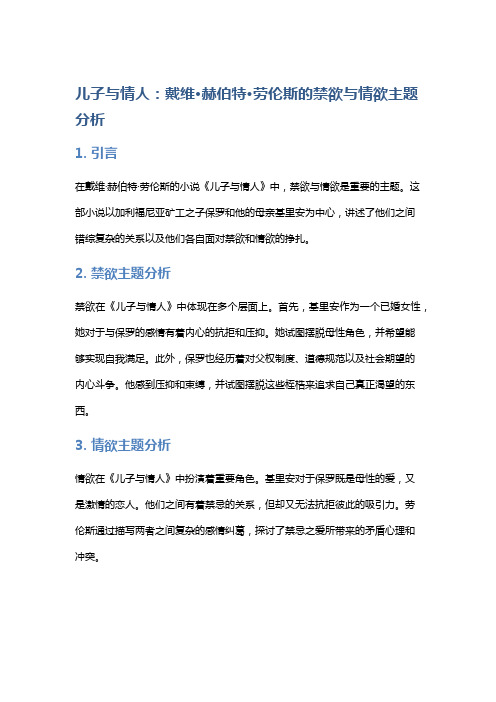
儿子与情人:戴维·赫伯特·劳伦斯的禁欲与情欲主题分析1. 引言在戴维·赫伯特·劳伦斯的小说《儿子与情人》中,禁欲与情欲是重要的主题。
这部小说以加利福尼亚矿工之子保罗和他的母亲基里安为中心,讲述了他们之间错综复杂的关系以及他们各自面对禁欲和情欲的挣扎。
2. 禁欲主题分析禁欲在《儿子与情人》中体现在多个层面上。
首先,基里安作为一个已婚女性,她对于与保罗的感情有着内心的抗拒和压抑。
她试图摆脱母性角色,并希望能够实现自我满足。
此外,保罗也经历着对父权制度、道德规范以及社会期望的内心斗争。
他感到压抑和束缚,并试图摆脱这些桎梏来追求自己真正渴望的东西。
3. 情欲主题分析情欲在《儿子与情人》中扮演着重要角色。
基里安对于保罗既是母性的爱,又是激情的恋人。
他们之间有着禁忌的关系,但却又无法抗拒彼此的吸引力。
劳伦斯通过描写两者之间复杂的感情纠葛,探讨了禁忌之爱所带来的矛盾心理和冲突。
4. 禁欲与情欲之间的对比在《儿子与情人》中,禁欲与情欲形成鲜明对比。
禁欲代表着社会和道德束缚下抑制自我的一种状态,而情欲则象征着个体真实而强烈的渴望和欲望。
这两种力量之间的冲突使得角色们陷入内心纠结和混乱。
5. 结论通过分析《儿子与情人》这部小说中禁欲与情欲主题,我们可以看到戴维·赫伯特·劳伦斯在文学中对于个体自由、社会规范以及道德观念进行了深入探讨。
这部作品通过描绘角色的内心斗争,展现了禁欲与情欲之间的复杂关系,深入探索人性和情感。
劳伦斯以其独特的写作风格和透彻思考的观点,使得《儿子与情人》成为一部引人深思的文学经典。
以上是对《儿子与情人》中禁欲与情欲主题的简要分析。
在这部小说中,戴维·赫伯特·劳伦斯通过生动的角色塑造和丰富复杂的情节,成功地将禁欲与情欲交相辉映,从而让读者更好地理解个体内心挣扎和社会规范之间的冲突。
这个主题不仅代表了作品本身所要表达的意义,也蕴含着更深层次的哲学探索。
《儿子与情人》中的象征主义的开题报告

《儿子与情人》中的象征主义的开题报告《儿子与情人》是法国作家阿尔贝·卡缪所写的一部小说,讲述了一个年轻人马修在爱情与亲情之间的纠葛与挣扎,以及他最终走向自我救赎的过程。
在小说中,卡缪采用了象征主义手法,通过各种象征物的描写,深入探讨了人类内心的情感与心理状态。
本次开题报告旨在探讨《儿子与情人》中的象征主义手法。
首先,文章将对象征主义作出解释,指出其含义与特点。
其次,文章将列举小说中出现的象征物并作出解读,分析这些象征物背后所代表的意义和象征。
最后,文章将总结象征主义在小说中的作用,探讨其贯穿于小说情节与人物塑造之中的重要性。
象征主义是一种文学运动,起源于19世纪末的法国。
它建立在浪漫主义和象征手法的基础上,强调诗意和神秘主义。
象征主义处理的不是客观事物本身,而是事物背后所代表的符号和象征。
它通过象征和隐喻的手法,探究主人公的内心世界和真实情感。
在《儿子与情人》中,卡缪运用象征主义手法,运用具象的符号及意象形象化的默示,提炼马修的内心独处和现实生活之间的微妙关系,揭示人类的情感冲突和生命意义的探索。
小说中的象征物有很多,其中最突出的便是马修手中拿着的管子。
管子象征着马修在现实生活中所扮演的角色,即一个可有可无的人。
在小说一开始,马修从住在充满幽默感与辛酸日子的生活中走出,拿起一个管子,像个英雄那样走向未来,但实际上,这个管子对他来说毫无意义,是对他生活的反感。
在同一个场景里出现的,还有一只蜗牛和一些花卉。
这些都是具有象征意义的物品,代表着马修内心深处的追求和愿望,比如蜗牛象征着马修的怯弱,花卉则象征着他内心的感性世界。
此外,小说中还有许多象征物,如小说结尾出现的水缸、纸张和火把则分别象征着试图挽回丧失的志向、新的生命和能够解放人类精神的力量。
总的来说,《儿子与情人》中的象征主义手法,使得小说中的情节与人物更加丰富和深刻。
通过对象征物的描写,读者能够更好地理解卡缪要表达的思想和情感意义,深入探究人性的哲学和意义。
儿子与情人现实意义和启示

儿子与情人现实意义和启示【原创版】目录1.引言:介绍《儿子与情人》这本书的背景和作者2.主题一:儿子与父亲的关系3.主题二:情人与现实生活的关系4.主题三:自我救赎与成长5.结论:书籍的现实意义和启示正文《儿子与情人》是英国作家 wrence 的一部半自传体小说,通过描绘主人公保罗与母亲、父亲、情人之间的微妙关系,剖析了家庭、爱情、成长等主题。
首先,书中最突出的主题之一就是儿子与父亲的关系。
在小说中,保罗与父亲的关系紧张而复杂。
父亲是一个严厉而专制的人,他对保罗的教育方式近乎虐待。
这使得保罗对父亲充满了恐惧和憎恨,他试图通过逃离家庭来摆脱父亲的影响。
然而,在逃离的过程中,保罗发现自己在某种程度上与父亲有相似之处,这让他对自己产生了怀疑和厌恶。
这种对父子关系的描绘,让我们思考亲子关系中的权力、控制、依赖等问题,以及如何处理这些关系。
其次,情人与现实生活的关系也是小说的一个重要主题。
保罗的情人玛丽是一个充满活力和热情的女性,她给保罗带来了自由和快乐的感觉。
然而,玛丽同时也是一个现实主义者,她明白自己和保罗的家庭背景有着巨大的差距,这使得她对与保罗的未来充满了担忧。
这种对爱情与现实的描绘,让我们思考爱情在现实生活中的位置,以及如何在爱情和现实之间做出选择。
最后,自我救赎与成长是《儿子与情人》的另一个重要主题。
在经历了种种挫折和痛苦之后,保罗逐渐意识到,他必须摆脱对父亲的恐惧和憎恨,才能真正成长为一个独立的人。
这种对自我救赎和成长的描绘,让我们思考如何面对自己的过去,以及如何通过自我救赎来实现成长。
总的来说,《儿子与情人》是一部具有深刻现实意义和启示的小说。
它让我们思考亲子关系、爱情与现实的关系,以及自我救赎和成长。
儿子与情人开题报告

儿子与情人开题报告儿子与情人在这个充满纷争和变化的世界中,人们的关系也变得越来越复杂。
其中,父母与子女之间的关系尤为重要,而儿子与情人之间的关系更是一个备受关注的话题。
本文将探讨儿子与情人之间的关系,旨在帮助读者更好地理解和处理这一关系。
首先,儿子与情人之间的关系是一个多层次的互动过程。
儿子作为一个家庭的一员,他的情感需求和成长过程都会受到家庭环境的影响。
而情人则是一个陪伴儿子成长的人,她在儿子的成长中扮演着重要的角色。
因此,儿子与情人之间的关系既有亲情的成分,也有爱情的成分。
这种关系的复杂性使得儿子与情人之间的相处变得更具挑战性。
其次,儿子与情人之间的关系也受到社会和文化的影响。
在一些传统的社会中,儿子与情人之间的关系往往被视为禁忌或不被接受。
这可能导致儿子和情人之间的矛盾和冲突。
然而,在现代社会中,人们对于儿子与情人之间的关系持更加开放和包容的态度。
这使得儿子和情人能够更自由地表达他们的情感和需求,从而建立更健康和稳定的关系。
另外,儿子与情人之间的关系也受到个体差异的影响。
每个人的性格、经历和价值观都不同,这会影响他们与他人建立关系的方式和程度。
有些儿子可能更依赖情人,而有些儿子可能更独立和自主。
这种差异使得儿子与情人之间的关系变得更加多样化和复杂化。
在处理儿子与情人之间的关系时,家长和情人都需要采取一些策略和方法。
首先,建立良好的沟通是关系发展的基础。
儿子和情人应该互相倾听和理解对方的需求和意见,共同解决问题和冲突。
其次,尊重和包容是关系稳定的重要因素。
儿子和情人应该尊重彼此的个人空间和独立性,同时也要包容对方的差异和缺点。
最后,建立共同的兴趣和目标可以增强关系的亲密度。
儿子和情人可以一起参加活动、分享经验,从而增进彼此之间的了解和亲密感。
总之,儿子与情人之间的关系是一个复杂而多样化的话题。
它受到家庭、社会和个体差异的影响,需要家长和情人共同努力来建立和维护。
通过良好的沟通、尊重和包容,以及共同的兴趣和目标,儿子与情人之间的关系可以得到进一步的发展和巩固。
儿子与情人的开题报告
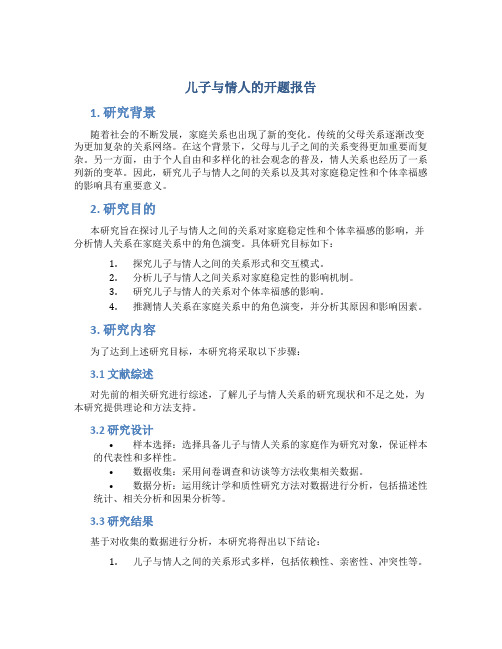
儿子与情人的开题报告1. 研究背景随着社会的不断发展,家庭关系也出现了新的变化。
传统的父母关系逐渐改变为更加复杂的关系网络。
在这个背景下,父母与儿子之间的关系变得更加重要而复杂。
另一方面,由于个人自由和多样化的社会观念的普及,情人关系也经历了一系列新的变革。
因此,研究儿子与情人之间的关系以及其对家庭稳定性和个体幸福感的影响具有重要意义。
2. 研究目的本研究旨在探讨儿子与情人之间的关系对家庭稳定性和个体幸福感的影响,并分析情人关系在家庭关系中的角色演变。
具体研究目标如下:1.探究儿子与情人之间的关系形式和交互模式。
2.分析儿子与情人之间关系对家庭稳定性的影响机制。
3.研究儿子与情人的关系对个体幸福感的影响。
4.推测情人关系在家庭关系中的角色演变,并分析其原因和影响因素。
3. 研究内容为了达到上述研究目标,本研究将采取以下步骤:3.1 文献综述对先前的相关研究进行综述,了解儿子与情人关系的研究现状和不足之处,为本研究提供理论和方法支持。
3.2 研究设计•样本选择:选择具备儿子与情人关系的家庭作为研究对象,保证样本的代表性和多样性。
•数据收集:采用问卷调查和访谈等方法收集相关数据。
•数据分析:运用统计学和质性研究方法对数据进行分析,包括描述性统计、相关分析和因果分析等。
3.3 研究结果基于对收集的数据进行分析,本研究将得出以下结论:1.儿子与情人之间的关系形式多样,包括依赖性、亲密性、冲突性等。
2.儿子与情人之间的交互模式受到家庭文化和社会因素的影响,在不同家庭中表现不同。
3.儿子与情人关系对家庭稳定性具有重要影响,其中包括情感支持、冲突解决和共同经历等因素。
3.4 讨论与展望本研究的研究结果将呼应儿子与情人关系对家庭稳定性和个体幸福感的重要性。
对于家庭成员、心理咨询师和社会政策制定者,将提供有关儿子与情人关系的重要参考。
4. 研究意义本研究的主要意义在于:1.丰富了家庭关系研究领域,拓宽了家庭关系的研究视角。
儿子与情人的开题报告
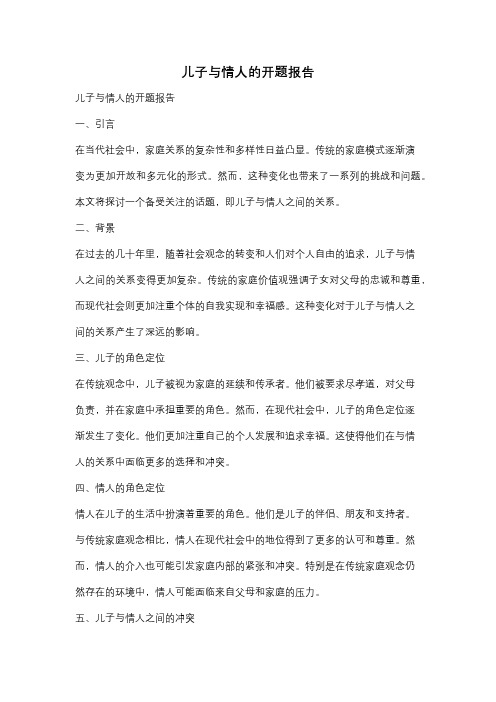
儿子与情人的开题报告儿子与情人的开题报告一、引言在当代社会中,家庭关系的复杂性和多样性日益凸显。
传统的家庭模式逐渐演变为更加开放和多元化的形式。
然而,这种变化也带来了一系列的挑战和问题。
本文将探讨一个备受关注的话题,即儿子与情人之间的关系。
二、背景在过去的几十年里,随着社会观念的转变和人们对个人自由的追求,儿子与情人之间的关系变得更加复杂。
传统的家庭价值观强调子女对父母的忠诚和尊重,而现代社会则更加注重个体的自我实现和幸福感。
这种变化对于儿子与情人之间的关系产生了深远的影响。
三、儿子的角色定位在传统观念中,儿子被视为家庭的延续和传承者。
他们被要求尽孝道,对父母负责,并在家庭中承担重要的角色。
然而,在现代社会中,儿子的角色定位逐渐发生了变化。
他们更加注重自己的个人发展和追求幸福。
这使得他们在与情人的关系中面临更多的选择和冲突。
四、情人的角色定位情人在儿子的生活中扮演着重要的角色。
他们是儿子的伴侣、朋友和支持者。
与传统家庭观念相比,情人在现代社会中的地位得到了更多的认可和尊重。
然而,情人的介入也可能引发家庭内部的紧张和冲突。
特别是在传统家庭观念仍然存在的环境中,情人可能面临来自父母和家庭的压力。
五、儿子与情人之间的冲突儿子与情人之间的冲突是一个普遍存在的问题。
这种冲突可能源于家庭的期望和传统观念与个人的自由和追求之间的冲突。
儿子可能感到困惑和无所适从,不知道如何平衡自己与家庭之间的关系。
情人也可能感到被忽视或不被认同,从而引发不满和矛盾。
六、儿子与情人的沟通与协调为了解决儿子与情人之间的冲突,沟通和协调是至关重要的。
儿子需要与情人坦诚地交流自己的内心感受和困惑,寻求情人的理解和支持。
同时,情人也需要理解和尊重儿子的家庭背景和价值观,并与他们共同探索解决方案。
通过积极的沟通和协商,儿子与情人可以建立更加健康和稳定的关系。
七、家庭的接纳与支持家庭的接纳和支持对于儿子与情人的关系至关重要。
父母和家庭成员应该尊重儿子的选择,并给予他们足够的自由和空间。
- 1、下载文档前请自行甄别文档内容的完整性,平台不提供额外的编辑、内容补充、找答案等附加服务。
- 2、"仅部分预览"的文档,不可在线预览部分如存在完整性等问题,可反馈申请退款(可完整预览的文档不适用该条件!)。
- 3、如文档侵犯您的权益,请联系客服反馈,我们会尽快为您处理(人工客服工作时间:9:00-18:30)。
[5]任培红.现代文明的悲剧---从人物悲剧透视《儿子与情人》中莫雷尔一家[J].外国文学,2008,(3):107-109.
[6]谭焕新.Character Analysis on Paul Morel in Son and Lovers[J].Overseas English,2011,(7):243-245.
其次,本人对国内现有研究角度的几个方面进行归纳、总结,对本选题的研究价值进行阐述与概括,吸取前人研究中有借鉴指导作用的部分,并找出前人研究中的不足之处加以完善。
最后,本人在通读小说全文,深刻理解小说的基础上,从整体出发,定下了自己在此选题的研究内容,订立基本框架,撰写提纲,写论文,同时对本次论文的研究成果下了评定性的结语。
论文提纲(含论文选题、论文主体框架)
Title:An Analysis of Paul's Tragedy in Sons and Lovers
Thesis Statement:The main cause ofPaul's Tragedy inSons and LoversisPaul's“Oedipus Complex”. There are many complex reasons for it and it hadaffectedPaulin many aspects.
2.2.2 The Influence ofPaul'sFamily
2.2.3 The Influence ofPaul'sOwn Weakness
3TheConsequenceofPaul'sOedipus Complex
3.1 The Influence onPaul'sLife
3.1.1 The Influence onPaul'sIndividual Life
二、框架:论《儿子与情人》中男主人公保罗的悲剧
引言
1.1劳伦斯生平及《儿子与情人》介绍
1.2文献综述
2.保罗的“恋母情结”
2.1“恋母情结”的内涵
2.1.1“恋母情结”的起源
2.1.2弗洛伊德关于“恋母情结”的理论
2.2保罗“恋母情结”的成因
2.2.1社会时代背景因素
2.2.2家庭因素
2.2.3保罗个人因素
[7]王毅.论《儿子与情人》中俄狄浦斯情结的悲剧[J].河北大学学报(哲学社会科学版),2001,(3):150-153.
5. Conclusion
主要参阅文献
[1]陈瑜明.劳伦斯笔下的悲剧性人物保罗[J].菁田学院学报,2004,(4)56-60.
[2]蒋炳贤.《劳伦斯评论集》前言[J].杭州大学学报,1989,(2):79-86.
[3]刘积源.论《儿子与情人》中保罗的“恋母情结”及形成的原因[J].西南科技大学学报(哲学社会科学版),2005,(2):1-6.
20世纪50年代以来,西方学者从很多不同角度研究劳伦斯的《儿子与情人》。肖勒在初评《儿子与情人》时就从这一方面分析了小说中两个主要主题的冲突:强烈母爱产生压抑的影响,和保罗在两次的两性关系中显示的灵肉之爱的分裂。肖勒认为劳伦斯在小说中暴露了他的弱点,就是没有使写作技巧发挥探讨小说内涵的作用。1951年肖勒改变了他的看法,他认为劳伦斯试图在小说中包含更多、更新更有重大道德意义的材料,比别的作家的作品都更能贴近读者。评论家多萝西·范·根特(Dorothy Van Ghent)也用形式与小说结构分析的方式对《儿子与情人》做了分析。
3、译介的数量和质量都有待大幅度提升。并且缺乏国外对表现了劳伦斯《儿子与情人中保罗悲剧产生因素的研究作品研究论文和专著,已有的有限的译本在质量方面还有待提高。
这就为笔者的毕业论文写作提供了写作依据和空间。
研究内容(包括基本思路、框架、主要研究方式、方法等)
一、基本思路:
首先,本人认真阅读了劳伦斯的原著《儿子与情人》,分析了保罗这个人物特征,通过各种途径大量查找和收集国内外有关男主角保罗的悲剧的资料。其中包括相关学者对保罗的悲剧产生的背景和多种原因的论述。
二、国内研究现状
《儿子与情人》自从问世以来,就不断被我国学者关注。我国学者一般从社会、家庭和个人因素方面进行分析和研究。他们认为保罗的悲剧是工业文明对人性的摧残而导致保罗家家庭体系扭曲,进而导致保罗母亲过分宠爱而扭曲人格的结果。
(一)社会因素
徐晓晴在她的《从<儿子与情人>中的婚姻裂变看英国工业文明的悲剧》(《安庆师范学院学报》(社会科学版)2002年第21卷第6期):中就提到造成莫瑞尔家庭中夫妻、母子关系的畸形变化的因素包括阶级差异,人与人之间的等级差距以及工业文明对人的自然天性的摧残等。刘积源在《论<儿子与情人>中保罗的“恋母情结”及形成的原因》(《西南科技大学学报》(哲学社会科学版)2005年第22卷第2期)中说到“健康的精神状态必须建立在健康的生活方式和社会制度的基础上。《儿子与情人》所着力描写的精神问题,同样包含着社会的因素。”。任培红在《现代文明的悲剧---从人物悲剧透视<儿子与情人>中莫雷尔一家》(《外国文学》2008年第22卷第3期)也认为在工业化的进程中,阶级不平等摧残了劳动人民的身心,破坏了劳动人民的幸福,并造成了下一代的悲剧。
Outline:
1. Introduction
1.1. Brief Introduction on Lawrence andSons and Lovers
1.2.Literature Review
t is“Oedipus Complex”?
由于《儿子与情人》是一部心理分析型小说,因此从心理学角度分析这部小说是近年来西方不少学者采用的方法。著名学者格•霍尔德内斯在《wrence历史、思想意识与虚构》一书中说“应该用唯物主义考察文学现象”。因为“俄狄蒲斯情结”是小说中的一重大主题,所以从心理学角度分析恋母情结形成成为近来西方学者的选择。
研究意义:
笔者认为,研究该选题的意义就在于以下三个方面:第一,劳伦斯在《儿子与情人》中描写保罗的悲剧时采用了丰富的人物心理描写,研究该选题有利于我们了解劳伦斯在这部小说中是如何运用这一手法的;第二,保罗的悲剧发生在英国的维多利亚时期,研究该选题可以使我们了解当时的社会背景;第三,对保罗的悲剧的研究有着重要的社会现实意义,研究该选题可以使我们对现代机器带来的人际关系问题、家庭问题进行深思,对建设和谐家庭、社会有很大的启示意义。
3.恋母情结对保罗的影响
3.1对保罗生活的影响
3.1.1对保罗个人生活的影响
3.1.2对保罗家庭生活的影响
3.2对保罗爱情的影响
3.2.1对保罗和米丽亚姆爱情的影响
3.2.2对保罗和克莱拉爱情的影响
4.保罗的悲剧给我们的启示
5.结束语
三、主要研究方法:仔细研读劳伦斯的《儿子与情人》,查找大量的前人研究专著、期刊论文,并利用网上数据库和搜索引擎收集相关资料。然后对所得资料进行整理,做好笔记,在此基础上对其进行分析、对比、整合。采取列事实,摆依据,引用等方法进行论证,从而得出自己的结论。
毕业设计(论文)开题报告
(由学生填写)
学生姓名
专业
班级
拟选题目
An Analysis of Paul's Tragedy in Sons and Lovers
选题依据:
通过在大学期间三个学期的英美文学课程的学习,笔者已经掌握了相关的文学知识并具备了一定的文学鉴赏能力。《儿子与情人》作为英国作家戴维·赫伯特·劳伦斯的重要代表作之一和半自传体小说,在世界文坛上占有重要地位。《儿子与情人》描述了20世纪初英国中部贝斯吾德小镇上莫瑞尔一家两代人的生活,是人们了解20世纪英国下层人民生活的一扇“窗户”。而保罗在故事中的悲剧更让我们了解了资本主义工业化进程对自然的破坏,对心灵和精神的扭曲。而对保罗的悲剧产生因素的探究不仅能够了解当时的社会体系,家庭环境对人格和思想的塑造性,更能从研究中获得经验和教训。迄今为止,虽然国内外很多学者对这一选题有不同的研究成果,但其研究角度和成果的质量和引进都有不足,这为笔者的毕业论文提供了一定的研究依据和空间。
(二)家庭因素
张文静在《工业文明下人际关系的扭曲---对<儿子与情人>的探讨》(《黄山学院学报》2009年第11卷第4期)中总结出“因此,夫妻间的矛盾导致了扭曲的父子和母子关系。失败的婚姻最终导致了母子间的畸恋。陈瑜民在《劳伦斯笔下的悲剧性人物保罗》(《菁田学院学报》2004年第1卷第4期)中提到“非正常的母爱在很大程度上扭曲了保尔成年期的心理”,“畸形的母爱成为保罗精神的枷锁,他实际上已成为了被阉割的‘心理阳痿’的男人”。保罗和母亲的畸恋阻碍了他正常爱情的发展,他丧失了爱的能力,他无法全心全意爱一个女孩。保罗就曾经对母亲说过“只要你在,我永远都不会遇到合适的女人”。刘积源在《论<儿子与情人>中保罗的“恋母情结”及形成的原因》(《西南科技大学学报》(哲学社会科学版)2005年第22卷第2期)总结保罗的恋母情结使他丧失了爱除母亲外的其他女人。总之,畸形的母爱是造成保罗悲剧的重要因素,正如赵渭绒在《畸形母爱:生命中不能承受之重---<孔雀东南飞>与<儿子与情人>之比较》(《广西民族学院学报》(哲学社会科学版)2005年第27卷第5期)中提到“焦母和莫雷尔太太虽属不同时代的女性,却都因自己婚姻的不幸,将自己对丈夫的爱转移到儿子身上,与儿子的爱人展开了你死我活的掠夺,,导演了儿子的人生悲剧,也造成了自身的不幸。
2.1.1 Origin of“Oedipus Complex”
2.1.2 Freud’s Theory of“Oedipus Complex”
2.2. Reasons forPaul's“Oedipus Complex”
2.2.1 The Influence of Social Background
